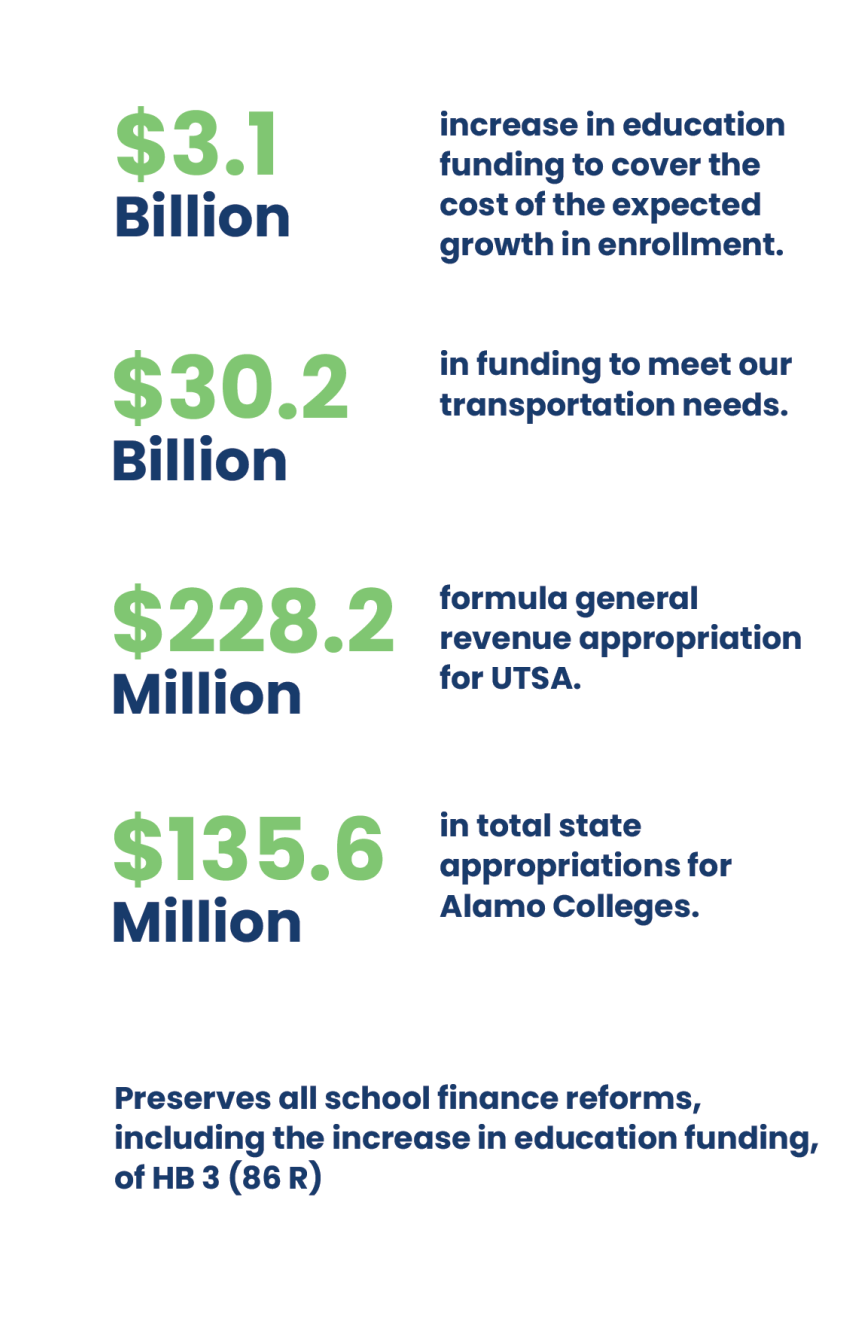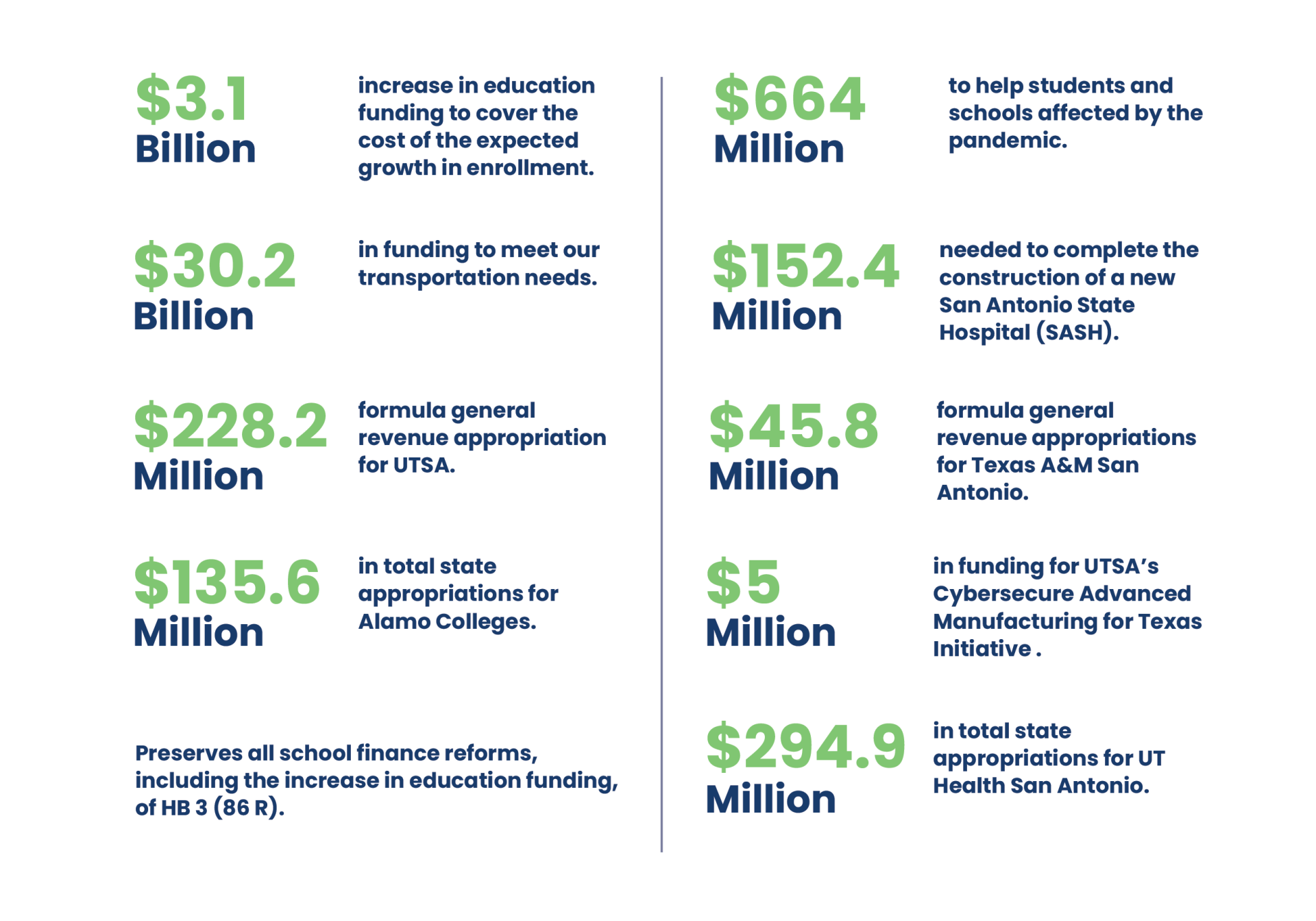Site Language:
Follow Us
Join our newsletter
Get the latest news delivered to your inbox.
Small Business:
Senate Bill 678
Authored by Senator Alvarado, the bill generates a small business disaster recovery loan program for the state of Texas. SB 678 produces a fund which provides financial assistance (in the form of loans) to small businesses affected by the COVID-19 pandemic and or future disasters. The bill instructs the comptroller to “implement an application, rules, and guidelines governing the fund, program, and loans made to small businesses through the program.” SB 678 signed into law on June 16, 2021 and will become effective on September 1, 2021.
House Bill 1195
The passing of House Bill 1195 provided small businesses with the reassurance they needed. Authored by Representative Charlie Geren, House Bill 1195 ensures loans distributed under the Paycheck Protection Program will not be subject to state franchise taxes. Thus, small businesses are protected from an unexpected tax increase. HB 1195 became effective in May 2021.
House Bill 3271
This bill aims to address one of the main challenges small businesses face: access to capital. HB 3271 creates a micro business capital access program under which low interest loans are provided through community development financial institutions to micro businesses with fewer than 20 employees. The creation of this micro-business capital access program will continue strengthening micro businesses in San Antonio and across Texas. In San Antonio, there is an unmet annual demand of about $8.3 billion in capital for small businesses, this bill will help close this gap. HB 3271 became effective immediately in June 2021, but the biennial budget did not appropriate funds for the program to be executed.
Senate Bill 6
Senate Bill 6 expands civil liability protections to protect premises business owners, product manufacturers, and health care providers which operated during the COVID-19 pandemic. This bill ensures that businesses are not burdened with lawsuits as a result of the pandemic. Physicians, health care providers, and first responders can claim immunity from a personal injury or death suit if a pandemic disease (e.g., COVID-19) was present in the patient during the challenged care or was a producing cause of the challenged care.
SB 6 does not provide complete immunity, and still makes it possible for businesses to be held accountable who need to be. This bill not only protects health care workers during the current COVID-19 pandemic, but also for future pandemics. SB 6 was signed into law on June 14, 2021 and became effective immediately.
Senate Bill 14
Various large cities across the state have attempted to enforce local paid sick leave ordinances that required private businesses to offer a certain number of paid sick days. Senate Bill 14 by Senator Creighton would’ve created a statewide framework for employment laws in the state. Despite concerns that this bill would preempt our local Non-Discrimination Ordinance (NDO), there was language in the bill to affirm that this was not the intent of the bill. Despite multiple efforts by SAHCC to support and move this bill forward, the bill passed the House but failed in the Senate.
Education
House Bill 1525
Authored by Representative Dan Huberty and sponsored by Senator Taylor in the Senate, HB 1525 made minor statutory changes to align with the changes of HB 3 from the 86th Legislative Session. HB 1525 dedicates $2 billion to address the learning loss students experienced as a result of COVID-19 and the Winter Storm. This bill also provides an additional $464 million in grant funding for students with dyslexia, autism, and students experiencing homelessness. HB 1525 supplies funding for the Teacher Incentive Allotment (created by HB 3 of the 86th Legislative Session) which incentivizes the highest performing teachers to serve the lowest performing schools by offering them salary increases. HB 1525 was signed into law on June 16, 2021.
The 2022-2023 biennial budget ensures that all public education reform measures created by HB 3, passed during the 86th Legislative Session, are properly maintained and financially supported.
House Bill 1530
Authored by Chairman Murphy, HB 1530 included $4.3 billion in Tuition Revenue Bonds to fund infrastructure projects for public institutions of higher education across the state. The last time the Texas Legislature passed a tuition revenue bond bill was 2015, and prior to that, 2006. The bill included the following amount of funding to our local institutions of higher education:
- UTSA: $145.1 million for construction of an Innovation, Entrepreneurship, and Careers building.
- UT Health San Antonio: $99 million for construction of the Glenn Biggs Institute for Alzheimer’s & Neurodegenerative Diseases building.
- Texas A&M San Antonio: $67.5 million for construction of a Public Health and Education building.
Despite the support of SAHCC, HB 1530 passed the House but failed in the Texas Senate.
Workforce Development
Senate Bill 1102
Senate Bill 1102 establishes the Texas Reskilling and Upskilling through Education (TRUE) Program. This program was created to put Texans back to work in high-demand occupations. In addition, the TRUE program helps to hasten the ability for collaboration between higher education and business partners. Such a program seeks to provide training and credentials for displaced and underemployed workers. The TRUE program helps to put Texans affected by the COVID-19 pandemic back to work while striving to improve workforce development and coordination between the state's employers, community, and technical colleges.
TRUE helps to promote higher education and business partners across the state to collaborate and provide customized, enhanced programs that teach high-demand skills that lead to significant industry certifications and credentials for underemployed workers. This program will help invest funds to help eligible higher education institutions grow their capacity by expanding, accelerating, and redesigning workforce programs, which are essential to attaining the state's higher education goals and the growth of the Texas economy. Senate Bill 1102 became effective immediately on June 14, 2021.
House Bill 3767
The passage of House Bill 3767 helps to create the Tri-Agency Workforce Initiative, which strengthens the current work of the Texas Education Agency, Texas Higher Education Coordinating Board, and the Texas Workforce Commission. Due to the COVID-19 pandemic, the Texas workforce has faced multiple prolonged impediments. State agencies who oversee workers' success must be working in partnership by delivering transparent data and enhancing workforce and education funding. HB 3767 supports workforce development in Texas by making the temporary collaborative work of the Tri-Agency permanent. The key provisions of this House Bill seek to strengthen and enhance the current work of the Tri-Agency.
The key provisions of House Bill 3767 consist of improving the Texas longitude data systems to help identify and analyze key trends in education and workforce; assist the state in managing and driving accountability by measuring the performance of all three agencies, and lastly, coordinating valuable careers and skills to help individuals as they navigate the changing workforce nature. SAHCC registered a neutral position for HB 3767. House Bill 3767 was signed into law by Governor Abbott on June 18, 2021 and will become effective on September 1, 2021.
Economic Development
Chapter 313 Reauthorization
Chapter 313 of the Texas tax code establishes a program which lessens the local school district maintenance and operation property tax burden of qualifying businesses for a limited 10-year period. The program aims to attract capital-intensive businesses and high-paying jobs to Texas. A report demonstrated that from its birth to September 2020, the program has “brought over $200 billion in capital investment and 56,000 direct and indirect jobs to Texas.” The program is set to expire on December 31, 2022, and various bills sought to reauthorize the program. HB 4242 sought to grant the program a 2-year extension, and HB 1502 sought to grant the program a 10-year extension. HB 1556 sought to reform the program by reforming the amount of school district revenue protection payments developers agree to pay to school districts and payments in lieu of tax. HB 4242 passed the House but failed in the Senate, while HB 1502 and HB 1556 never made it out of the House.
Healthcare
House Bill 4
Authored by Representative Price, House Bill 4 seeks to expand telehealth and telemedicine in Texas. During the Pandemic, Governor Abbott issued various emergency waivers related to the delivery of specific health care services in the state of Texas. This bill seeks to make permanent the state’s emergency waivers and therefore expand the use of telemedicine and telehealth during the pandemic. In addition, the bill requires Medicaid and other public health insurance programs, to cover certain health care services provided via telehealth and telemedicine.
To address the gaps related to the use of technology in rural communities, the bill allows the Health and Human Services Commission to identify service areas where audio-only services must be covered. The bill incorporates audio-only services into the scope of telehealth exceptions for behavioral health services. On June 15th, 2021, House Bill 4 was signed into law by Governor Gregg Abbott and was effective immediately.
San Antonio State Hospital (SASH)
The 2022-2023 biennial budget (Senate Bill 1) includes funding for the remaining $152.4M needed to complete the construction of a new San Antonio State Hospital (SASH). The construction of a new San Antonio State Hospital would replace the old San Antonio State Hospital with a new 300-bed facility that is part of a legislative push to revamp the state's mental health system. The new facility is expected to open January 2024. Senate Bill 1 was authored by Senator Nelson.
Transportation
The 2022-2023 biennial budget (Senate Bill 1) includes $31.1 billion in funding for transportation, a 2.9% decrease from the 2020-2021 budget. Even with the slight decrease, there is not a threat to the state’s commitment to fully funding the State’s Highway Fund and transportation needs of the San Antonio region.
House Bill 2219
The bill aims to support initiatives that protect and expand the ability of VIA to fund and deliver public transportation services and options within the community. The bill will give TxDOT the ability to enter long-term obligations for up to 30 years. These obligations pertain to highway and public transportation projects secured by future revenue. In this case, the expansion of VIA to fund and deliver public transportation services and options within the community would be applicable through House Bill 2219. On June 18, 2021, House Bill 2219 was signed into law by Governor Gregg Abbott and became effective immediately.
Broadband
Expanding broadband access was one of Governor Abbott's emergency items for the 87th Texas legislative session. Filed by Representative Trent Ashby, Senate Bill 5 looked to address this emergency item. House Bill 5 calls for working with the State and private internet service providers to explore the best options to increase availability, adaptation, and quality of high-speed internet services in underserved areas where connectivity is needed the most. In addition, House Bill 5 will establish a broadband development office that would be affiliated with the University of Texas System and will mandate the creation of a broadband map of Texas, identifying areas across the state where less than 80% of Texans have high-speed internet access. House Bill 5 was signed into law by Governor Abbott on June 15, 2021 and became effective immediately.
Military, Veterans & Spouses
House Bill 33
This bill pertains to actions enabling the award of postsecondary course credits leading to workforce credentials based on military experience, education, and training. Such legislation ensures that programs of study from colleges or industry-based certification schools provide workforce credentials to help identify programs or courses in which skills are obtained through military experiences, education, and training. The bill applies to any official military record presented to the institution that describes the substance of training completed by the student and confirms the successful completion of their training. In addition, the student's training must apply to the course they seek credit for and must be listed in the institution's course catalog.
Such publications shall be posted on their website, giving details of relevant studies that identify and align with the student's military experience, education, or training. Authored by Representative Dominguez, HB 33 was signed by Governor Abbot on June 15th, 2021, and will take effect on September 1st, 2021.
House Bill 2365
The passage of House Bill 2365 recognizes Brooke Army Medical Center as a Medicaid provider. Being a tier 1 military treatment facility, BAMC plays a vital role in providing healthcare services to military service members and civilians. Being a military town, the relationship between service members and civilians is a significant relationship to have. Not only is BAMC helping to save lives on the frontline, but they are also helping to save lives in the community. In addition, the bill establishes financial relief for civilian trauma patients who are treated at Brooke Army Medical Center and are covered by Medicaid. Thus, ensuring that those civilian patients who are being treated at BAMC are not being subdued with unwarranted debt. HB 2365 was authored by Representative Ray Lopez, sponsored by Senator Donna Campbell, signed into law on June 15, 2021, and goes into effect on September 1, 2021.
Senate Bill B337
The bill introduces the allocation of grants by the Texas Workforce Commission to accelerate the participation of specific veterans and military personnel in apprenticeship training programs. A commission will develop and administer a program in which they may award grants to one or more nonprofit organizations that will oversee the participation in the apprenticeship training programs for veterans and active-duty service members transitioning into civilian employment. In addition, the commission will adopt rules for administration to oversee that state funds being allocated to a nonprofit organization are being used appropriately. Senate Bill 337 was authored by Senator Beverly Powell and signed by Governor Gregg Abbott on May 30, 2021. It will take effect on September 1st, 2021.
House Bill 139
HB 139 will help streamline the process for a veteran or military spouse to obtain an educator certification in Texas. This bill looks to expand upon legislation passed during the 86th Legislative Session that streamlines the licensing and certification process for veterans and military spouses looking to obtain a professional license to work in Texas. The bill aims to provide exceptions to certification requirements; assist in simplifying and shortening the process for transferring an occupational license or certification; and rewards credit towards certification requirements for educational, clinical, and professional experience. House Bill 139 was authored by Representative Brad Buckley and signed into law on May 18, 2021; it will be effective beginning September 1, 2021.
Hola!
Have a question or wondering how you can get involved with the San Antonio Hispanic Chamber of Commerce?
Join the SAHCC Newsletter
Sign up below to be included in our email updates so you always are in the know!






